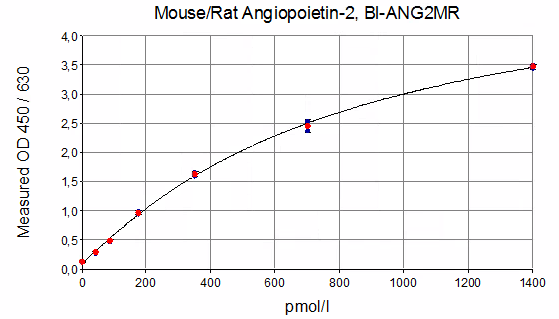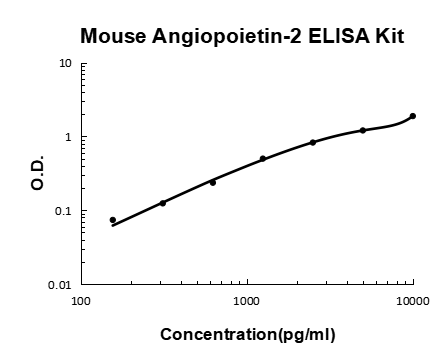
The figure shows a typical standard curve for the Mouse Angiopoietin 2 ELISA and Rat Angiopoietin 2 ELISA. The immunoassay is calibrated against recombinant Angiopoietin-2 protein.
Angiopoietin-2 mouse/rat ELISA
BI-ANG2MR
Assay Sample Typemouse/rat serum, plasma
Product group Assays
Overview
- SupplierBiomedica
- Product NameAngiopoietin-2 mouse/rat ELISA
- Delivery Days Customer7
- ApplicationsELISA
- Applications SupplierELISA
- Assay Detection Range18.3-1400 pmol/l
- Assay Precisionintra-assay: 9%, inter-assay: 4%
- Assay Sample Typemouse/rat serum, plasma
- Assay Sensitivity18.3 pmol/l
- Assay Test PrincipleSandwich ELISA
- Assay Time5.5h
- CertificationResearch Use Only
- Scientific DescriptionProduct Characteristics: The Angiopoietin-2 Mouse/Rat immunoassay is a 5.5 h, 96-well sandwich ELISA for the quantitative determination of Angiopoietin-2 in mouse and rat serum and plasma. Target Information: Angiopoietin-2 (ANG2) is a glycosylated growth factor that is specific for endothelial cells (ECs). ANG2 is expressed in embryonic vessels and contributes to the formation of new vasculature. In adults, it is restricted to sites of vascular remodeling (e.g. ovary, uterus, placenta) and wound healing. ANG2 is regulated by the cytokine vascular endothelial growth factor (VEGF). Together with VEGF, ANG2 induces endothelial cell migration, proliferation, and vascular sprouting. During angiogenesis, ANG2 exerts its effects via the angiopoietin-1/TIE2 receptor signaling system on endothelial cells. Disruption of this signaling leads to the loss of endothelial integrity. In consequence, the endothelium responds to various pro-inflammatory cytokines and growth factors. Thus, ANG2 might cause vascular micro-inflammation in patients with chronic kidney disease (CKD). Various studies demonstrated that ANG2 levels increase with CKD stage and are associated with fluid overload and abnormal cardiac structure. Furthermore, ANG2 concentrations correlate with mortality in patients with CKD stages 4-5. Although ANG2 levels recover after successful kidney transplantation, ANG2 continues to be a cardiovascular risk factor in this population. In cancer, targeting the TIE2-Angiopoietin pathway has shown promising results in some pre-clinical and clinical trials, including studies on recurrent or metastatic breast and renal cell carcinomas.
- Storage Instruction2-8°C
- UNSPSC41116133



